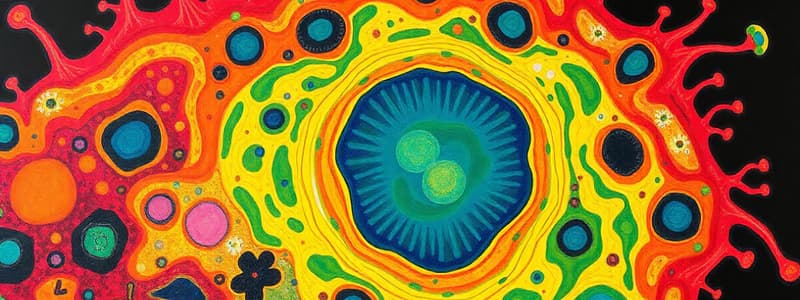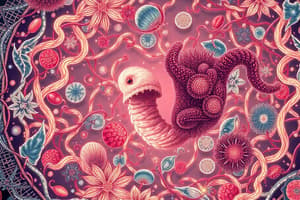Podcast
Questions and Answers
Microbiology is the study of ______, including bacteria, viruses, fungi, and protists.
Microbiology is the study of ______, including bacteria, viruses, fungi, and protists.
microorganisms
Maintaining ______ is essential for ecosystem health.
Maintaining ______ is essential for ecosystem health.
biodiversity
Physiology focuses on the functions and mechanisms within a living ______.
Physiology focuses on the functions and mechanisms within a living ______.
organism
Botany is the branch of biology that studies ______.
Botany is the branch of biology that studies ______.
Zoology involves the study of animal anatomy, physiology, and their ______ with the environment.
Zoology involves the study of animal anatomy, physiology, and their ______ with the environment.
Biology is the study of ______ and living organisms.
Biology is the study of ______ and living organisms.
Cells are characterized by their structure, including a membrane-bound ______ and organelles.
Cells are characterized by their structure, including a membrane-bound ______ and organelles.
______ cells are simpler, lacking a nucleus and membrane-bound organelles.
______ cells are simpler, lacking a nucleus and membrane-bound organelles.
Genetics is the study of genes, heredity, and ______ in living organisms.
Genetics is the study of genes, heredity, and ______ in living organisms.
Evolution is the process of change in the heritable characteristics of biological ______ over successive generations.
Evolution is the process of change in the heritable characteristics of biological ______ over successive generations.
Ecology is the study of the interactions between organisms and their ______.
Ecology is the study of the interactions between organisms and their ______.
Energy flow and nutrient cycling are crucial aspects of ______ functioning.
Energy flow and nutrient cycling are crucial aspects of ______ functioning.
Natural selection results in the adaptation of ______ to their environment.
Natural selection results in the adaptation of ______ to their environment.
Flashcards
Biology
Biology
The study of life and living organisms, including their structure, function, growth, evolution, distribution, and taxonomy.
Cell
Cell
The basic unit of life, carrying out life processes in all living organisms.
Genetics
Genetics
The study of genes, heredity, and variation in living organisms.
Evolution
Evolution
Signup and view all the flashcards
Ecology
Ecology
Signup and view all the flashcards
Prokaryotic cell
Prokaryotic cell
Signup and view all the flashcards
Eukaryotic cell
Eukaryotic cell
Signup and view all the flashcards
Natural Selection
Natural Selection
Signup and view all the flashcards
Microbiology definition
Microbiology definition
Signup and view all the flashcards
Botany focus
Botany focus
Signup and view all the flashcards
Zoology subject
Zoology subject
Signup and view all the flashcards
Physiology goal
Physiology goal
Signup and view all the flashcards
Microbes in Ecosystems
Microbes in Ecosystems
Signup and view all the flashcards
Study Notes
Introduction to Biology
- Biology is the study of life and living organisms, encompassing their structure, function, growth, origin, evolution, distribution, and taxonomy.
- It explores a broad range of topics, from the molecular level to entire ecosystems.
- Biology relies on observation, experimentation, and analysis to understand biological processes.
- Key disciplines within biology include botany (plants), zoology (animals), microbiology (microorganisms), and genetics.
Cell Biology
- Cells are the fundamental unit of life.
- All living organisms are composed of cells, which carry out essential life processes.
- Cells are characterized by their structure, including a membrane-bound nucleus and organelles.
- There are two main types of cells: prokaryotic and eukaryotic.
- Prokaryotic cells are simpler, lacking a nucleus and membrane-bound organelles.
- Eukaryotic cells are more complex, possessing a nucleus and various organelles, like mitochondria and endoplasmic reticulum.
- Cellular processes include metabolism, reproduction, and response to stimuli.
Genetics
- Genetics is the study of genes, heredity, and variation in living organisms.
- Genes are segments of DNA that carry instructions for building proteins and other essential molecules.
- DNA, the genetic material, contains the information necessary for cell function and reproduction.
- Genes determine traits and characterstics in individuals.
- Gene expression is the process by which information from a gene is used to create a functional product.
- Mutations in genes can lead to changes in traits.
Evolution
- Evolution is the process of change in the heritable characteristics of biological populations over successive generations.
- This change is driven by natural selection, where organisms better adapted to their environment are more likely to survive and reproduce.
- Evolution is supported by substantial evidence from various fields, including paleontology, comparative anatomy, and molecular biology.
- Natural selection results in adaptation of species to their environment.
- Species diversity is a result of the evolutionary process.
Ecology
- Ecology is the study of the interactions between organisms and their environment.
- This includes the study of populations, communities, ecosystems, and the biosphere.
- Ecological interactions, like predation, competition, and symbiosis, shape ecosystems.
- Energy flow and nutrient cycling are crucial aspects of ecosystem functioning.
- Maintaining biodiversity is essential for ecosystem health.
- Human impact on ecosystems is a significant area of ecological study.
Microbiology
- Microbiology is the study of microorganisms, including bacteria, viruses, fungi, and protists.
- Microorganisms play crucial roles in various ecological processes, including nutrient cycling and decomposition.
- They also have implications in areas like medicine, biotechnology, and agriculture.
- Microorganisms can have beneficial and pathogenic effects on humans.
- Understanding microbial interactions is important for various applications, such as disease control and bioremediation.
Physiology
- Physiology is the study of the functions and mechanisms within a living organism.
- It encompasses the study of various systems in the body, such as the nervous, circulatory, respiratory, and digestive systems.
- How these systems work together to maintain homeostasis is a key focus.
- Physiological responses to environmental and internal stimuli are studied.
- Human physiology focuses on the functions of the human body.
Botany
- Botany is the branch of biology that studies plants.
- It covers various aspects, from plant structure and function to plant reproduction and evolution.
- Plant physiology and ecology are key areas within botany.
- The role of plants in ecosystems is an important part of the field.
- Different types of plants, from algae to flowering plants, are studied.
Zoology
- Zoology is the branch of biology that studies animals.
- This includes animal anatomy, physiology, behavior, evolution, and ecology.
- Classification of different animal groups is also a part of zoology.
- Understanding animal behavior and their interactions with their environment is a focal point.
- The diversity of animal species around the globe is explored.
Studying That Suits You
Use AI to generate personalized quizzes and flashcards to suit your learning preferences.
Description
This quiz covers the fundamentals of biology, focusing on the study of life and living organisms. It explores various biological disciplines, cell structures, and the classifications of cells. Test your knowledge of essential concepts from cell biology and the broader field of biology.




